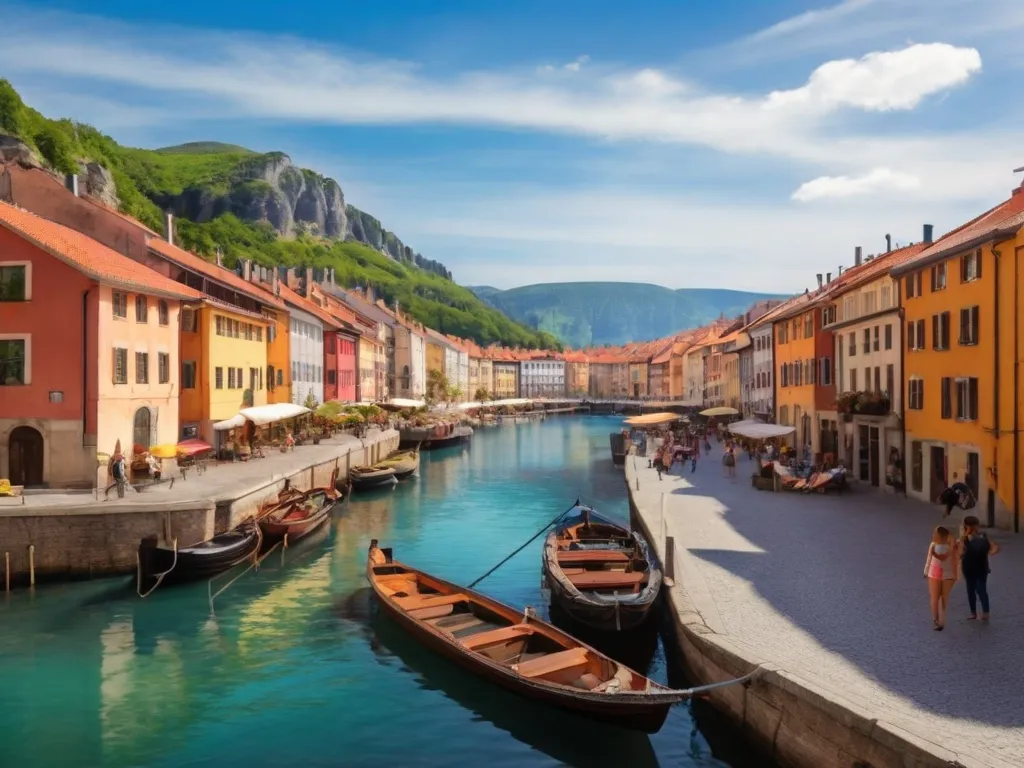Budget Travel Destinations in Europe
Europe is a continent with a wide variety of budget-friendly destinations. Whether you’re looking for a city break, a beach holiday, or a hiking trip, there are plenty of options available to you that won’t break the bank.
Here are a few of the best budget travel destinations in Europe:
- Budapest, Hungary
- Krakow, Poland
- Prague, Czech Republic
- Lisbon, Portugal
- Rome, Italy
These cities are all known for their rich culture, history, and beautiful architecture. They’re also all relatively affordable, making them great options for budget travelers.
In addition to these major cities, there are also many smaller towns and villages in Europe that offer great value for money. Some of the best budget-friendly destinations in Europe include:
- Seville, Spain
- Corfu, Greece
- Dubrovnik, Croatia
- Bulgaria
- Slovenia
These destinations offer a more relaxed and laid-back atmosphere than the major cities, and they’re also great places to explore the natural beauty of Europe.
No matter what your budget is, there are plenty of great budget travel destinations in Europe to choose from. So what are you waiting for? Start planning your trip today!
Cheapest Places to Visit in Europe
Europe is a continent with a wide range of destinations to offer, from the bustling cities of London and Paris to the quaint villages of Tuscany and the Greek islands. But with so many different places to choose from, it can be difficult to know where to start. If you’re looking for a budget-friendly trip to Europe, there are a number of great options available. Here are some of the cheapest places to visit in Europe:
- Budapest, Hungary: Budapest is a beautiful city with a rich history and culture. It’s also one of the most affordable cities in Europe, with a wide range of budget-friendly accommodation and activities available.
- Prague, Czech Republic: Prague is another great option for budget travelers. It’s a charming city with a lot to offer, including beautiful architecture, delicious food, and lively nightlife.
- Krakow, Poland: Krakow is a historic city with a lot of character. It’s also a very affordable city, with prices that are much lower than in other popular European destinations.
- Ljubljana, Slovenia: Ljubljana is a small but beautiful city that’s perfect for a relaxing getaway. It’s also very affordable, with prices that are comparable to those in Budapest and Prague.
- Belgrade, Serbia: Belgrade is a vibrant city with a lot to offer, including a rich history, delicious food, and lively nightlife. It’s also one of the most affordable cities in Europe, with prices that are much lower than in other major European cities.
These are just a few of the many great budget-friendly destinations in Europe. By doing some research, you can find a number of other affordable places to visit that fit your budget and interests.
Top 10 Budget-Friendly European Destinations
Europe is a continent with a wide variety of destinations to offer, from bustling cities to quaint villages. Whether you’re looking for a cultural experience, a beach vacation, or an outdoor adventure, you’re sure to find something to your liking in Europe. And the best part is that you can do it all on a budget.
Here are 10 of the most budget-friendly European destinations:
- Budapest, Hungary
- Prague, Czech Republic
- Krakow, Poland
- Ljubljana, Slovenia
- Bucharest, Romania
- Belgrade, Serbia
- Zagreb, Croatia
- Sofia, Bulgaria
- Istanbul, Turkey
- Athens, Greece
These cities are all affordable, with a wide range of accommodation, food, and activities to choose from. And they’re all packed with culture, history, and natural beauty. So if you’re looking for a budget-friendly European vacation, be sure to check out these 10 destinations.
Budapest, Hungary
Budapest is the capital and largest city of Hungary. It is located on the banks of the Danube River, and it is divided into two parts: Buda and Pest. Budapest is a popular tourist destination, and it is known for its beautiful architecture, its lively nightlife, and its thermal baths.
The average cost of a hotel room in Budapest is around €50 per night. A meal at a restaurant will cost around €15, and a beer will cost around €2. There are many free things to do in Budapest, such as visiting the Hungarian Parliament Building, taking a walk along the Danube River, or exploring the city’s many parks.
Prague, Czech Republic
Prague is the capital and largest city of the Czech Republic. It is located in the Vltava River Valley, and it is known for its medieval architecture, its cobblestone streets, and its lively atmosphere. Prague is a popular tourist destination, and it is often referred to as The City of a Hundred Spires.”
The average cost of a hotel room in Prague is around €50 per night. A meal at a restaurant will cost around €15, and a beer will cost around €2. There are many free things to do in Prague, such as visiting the Prague Castle, taking a walk through the Old Town Square, or exploring the city’s many museums.
Krakow, Poland
Krakow is the second-largest city in Poland. It is located in the south of the country, and it is known for its beautiful architecture, its rich history, and its lively atmosphere. Krakow is a popular tourist destination, and it is often referred to as The City of Kings.”
The average cost of a hotel room in Krakow is around €50 per night. A meal at a restaurant will cost around €15, and a beer will cost around €2. There are many free things to do in Krakow, such as visiting the Wawel Castle, taking a walk through the Old Town Square, or exploring the city’s many museums.
Ljubljana, Slovenia
Ljubljana is the capital and largest city of Slovenia. It is located in the center of the country, and it is known for its beautiful architecture, its lively atmosphere, and its proximity to the Alps. Ljubljana is a popular tourist destination, and it is often referred to as The City of Bridges.”
The average cost of a hotel room in Ljubljana is around €50 per night. A meal at a restaurant will cost around €15, and a beer will cost around €2. There are many free things to do in Ljubljana, such as visiting the Ljubljana Castle, taking a walk through the Old Town Square, or exploring the city’s many parks.
Bucharest, Romania
Bucharest is the capital and largest city of Romania. It is located in the southeast of the country, and it is known for its beautiful architecture, its rich history, and its lively atmosphere. Bucharest is a popular tourist destination, and it is often referred to as The Paris of the East.”
The average cost of a hotel room in Bucharest is around €50 per night. A meal at a restaurant will cost around €15, and
Europe Travel on a Budget
Europe is a continent with a wide variety of destinations to offer, from bustling cities to quaint villages, and from stunning beaches to majestic mountains. However, it can also be a very expensive place to travel. But don’t worry, it is still possible to travel around Europe on a budget. Here are some tips to help you save money on your next trip:
- Do your research.
The first step to saving money on your trip is to do your research and find the best deals on flights, accommodations, and activities. There are many websites and resources available to help you find cheap flights and accommodations, such as Skyscanner, Kayak, and Booking.com. You can also find discounts on activities by checking out websites like Groupon and LivingSocial.
- Travel during the off-season.
The best time to travel to Europe is during the shoulder seasons, which are spring and fall. During these times, you’ll find cheaper flights and accommodations, and there will be fewer tourists around.
- Stay in hostels.
Hostels are a great way to save money on accommodation. They’re usually very affordable, and they’re a great way to meet other travelers.
- Cook your own meals.
Eating out in Europe can be very expensive. To save money, cook your own meals in your accommodation. You can buy groceries at local markets or supermarkets.
- Use public transportation.
Taking public transportation is a great way to get around Europe without spending a lot of money. Buses, trains, and metros are usually very affordable, and they’re a great way to see the sights.
- Visit free attractions.
There are many free attractions to see in Europe. Some of the most popular include the Eiffel Tower, the Colosseum, and the Acropolis.
- Get discounts with a travel card.
There are a number of travel cards available that can give you discounts on transportation, attractions, and food. Some of the most popular include the Eurail Pass, the Interrail Pass, and the London Pass.
By following these tips, you can save money on your next trip to Europe and still have a great time.
- Q: What is the cheapest time to travel to Europe?
- A: The cheapest time to travel to Europe is during the shoulder seasons, which are spring and fall. During these times, you’ll find cheaper flights and accommodations, and there will be fewer tourists around.
- Q: What is the best way to get around Europe?
- A: The best way to get around Europe depends on your budget and the amount of time you have. If you’re on a tight budget, you can take public transportation, such as buses, trains, and metros. If you have more money to spend, you can fly between cities or take a ferry.
- Q: What are some of the free attractions to see in Europe?
- A: Some of the most popular free attractions to see in Europe include the Eiffel Tower, the Colosseum, and the Acropolis. There are also many free museums and art galleries to visit.
- Q: What are some tips for saving money on food in Europe?
- A: Some tips for saving money on food in Europe include cooking your own meals, buying groceries at local markets or supermarkets, and eating at budget-friendly restaurants.
- Q: What are some travel cards that offer discounts on transportation, attractions, and food?
- A: Some of the most popular travel cards that offer discounts on transportation, attractions, and food include the Eurail Pass, the Interrail Pass, and the London Pass.
How to Travel Europe for Cheap
Europe is a continent with a rich history, culture, and natural beauty. It is also a popular tourist destination, with millions of people visiting each year. However, traveling to Europe can be expensive, especially if you are on a budget.
If you are looking to travel Europe for cheap, there are a few things you can do to save money. Here are some tips:
- Plan your trip in advance.
This will help you to find the best deals on flights, accommodations, and activities.
- Consider traveling during the off-season.
This is when prices are typically lower.
- Stay in hostels or budget hotels.
This is a great way to save money on accommodations.
- Cook your own meals.
This will help you to save money on food.
- Use public transportation.
This is a more affordable way to get around than taking taxis or renting a car.
- Visit free attractions.
There are many free attractions in Europe, such as museums, parks, and historical sites.
- Get discounts for students, seniors, and other groups.
Many attractions and activities offer discounts for these groups.
By following these tips, you can save money on your trip to Europe and still have a great time.
How to Find Cheap Flights to Europe
One of the biggest expenses when traveling to Europe is airfare. However, there are a few ways to find cheap flights. Here are some tips:
- Use a flight search engine.
There are many different flight search engines available, such as Skyscanner, Kayak, and Google Flights. These engines can help you compare prices from different airlines and find the best deals.
- Book your flights in advance.
The earlier you book your flights, the more likely you are to find a good deal.
- Consider flying into a smaller airport.
Sometimes, you can find cheaper flights to smaller airports that are located outside of major cities.
- Be flexible with your travel dates.
If you are flexible with your travel dates, you can often find cheaper flights.
By following these tips, you can find cheap flights to Europe and save money on your trip.
How to Find Cheap Accommodation in Europe
Accommodation is another major expense when traveling to Europe. However, there are a few ways to find cheap accommodation. Here are some tips:
- Stay in hostels.
Hostels are a great way to save money on accommodation. They offer dorm-style rooms with shared bathrooms, and they are often located in central locations.
- Stay in budget hotels.
Budget hotels are another good option for saving money on accommodation. They offer private rooms with private bathrooms, and they are often located in convenient locations.
- Consider renting an apartment or house.
If you are traveling with a group of people, renting an apartment or house can be a more affordable option than staying in a hotel.
- Camping.
If you are on a tight budget, camping can be a great way to save money on accommodation. There are many campgrounds in Europe, and they are often located in beautiful settings.
By following these tips, you can find cheap accommodation in Europe and save money on your trip.
How to Save Money on Food in Europe
Food is another major expense when traveling to Europe. However, there are a few ways to save money on food. Here are some tips:
- Cook your own meals.
This is the best way to save money on food. You can buy groceries at the grocery store or at farmer’s markets, and cook your own meals in your hotel room or hostel.
- Eat at local restaurants.
Local restaurants are often cheaper than tourist restaurants. They also offer more authentic food experiences.
- Look for deals on food.
Many restaurants offer lunch specials or happy hour specials. You can also find discounts
Budget Backpacking in Europe
Introduction
Backpacking is a great way to travel Europe on a budget. By staying in hostels, cooking your own food, and using public transportation, you can easily travel around the continent for a fraction of the cost of a traditional vacation.
In this article, we’ll share our tips for budget backpacking in Europe. We’ll cover everything from how to find cheap flights and accommodation to where to eat and drink on a budget.
How to Find Cheap Flights
The best way to find cheap flights to Europe is to book your tickets in advance. Airlines often release their cheapest fares several months in advance, so if you can plan your trip well ahead of time, you’ll be able to score some great deals.
Another way to save money on flights is to fly into smaller airports. Major airports like London Heathrow and Paris Charles de Gaulle are often more expensive than smaller airports like London Stansted and Paris Orly.
Finally, consider flying with a budget airline. Budget airlines like Ryanair and EasyJet offer low-cost flights to destinations all over Europe.
Where to Stay
Hostels are a great option for budget backpackers. They’re usually very affordable, and they’re a great way to meet other travelers.
When choosing a hostel, make sure to read reviews to get an idea of what the atmosphere is like. Some hostels are party hostels, while others are more quiet and relaxed.
You can also find budget accommodation in guesthouses and bed and breakfasts. These options are usually a bit more expensive than hostels, but they offer more privacy and amenities.
How to Get Around
The best way to get around Europe is by train. Trains are fast, comfortable, and relatively affordable.
You can also get around by bus, but buses are usually slower and less comfortable than trains.
If you’re on a tight budget, you can also consider hitchhiking or taking carpools.
Where to Eat and Drink
Eating and drinking in Europe can be expensive, but there are plenty of ways to save money.
One way to save money is to eat at local restaurants. Local restaurants are often much cheaper than tourist restaurants, and they offer just as good food.
You can also save money by cooking your own food. Most hostels have kitchens, so you can buy groceries and cook your own meals.
Finally, consider drinking tap water instead of bottled water. Tap water is safe to drink in most European countries, and it’s much cheaper than bottled water.
Other Tips
Here are a few other tips for budget backpacking in Europe:
- Use a travel credit card that offers rewards or cash back.
Pack light. The less you pack, the less you’ll have to pay to transport your luggage.
- Stay flexible. If you’re flexible with your travel dates and destinations, you’ll be more likely to find cheap deals.
Be prepared for unexpected expenses. Things happen, so make sure you have some extra money set aside for emergencies.
Conclusion
Budget backpacking in Europe is possible if you’re willing to do some research and plan ahead. By following these tips, you can save money and have a great time exploring the continent.
Student Travel in Europe
Student travel in Europe is a great way to see the continent on a budget. There are many affordable options for flights, accommodations, and activities, and you can meet other students from all over the world.
Here are a few tips for student travel in Europe:
- Plan your trip in advance.
This will help you find the best deals on flights and accommodations.
- Consider traveling during the off-season.
This will be cheaper than traveling during peak season.
- Stay in hostels.
Hostels are a great way to meet other travelers and save money on accommodation.
- Cook your own meals.
This will save you money on food.
- Use public transportation.
This will be cheaper than taking taxis or renting a car.
Here are some of the best places to visit in Europe for students:
- London
is a great city for students to visit. There are plenty of things to see and do, and it’s a very affordable city.
- Paris
is another great option for students. It’s a beautiful city with a lot of history and culture.
- Barcelona
is a vibrant city with a lot to offer students. There are plenty of beaches, museums, and restaurants to explore.
- Berlin
is a great city for students who are interested in history and culture. It’s also a very affordable city.
- Prague
is a beautiful city with a lot of history and culture. It’s also a very affordable city.
Student travel in Europe is a great way to see the continent and meet other students from all over the world. With a little planning, you can travel to Europe on a budget and have a great time.
- What is the best time to travel to Europe for students?
The best time to travel to Europe for students is during the off-season, which is from September to May. This is when the weather is cooler and there are fewer tourists.
- What is the cheapest way to travel to Europe for students?
The cheapest way to travel to Europe for students is by plane. You can find cheap flights by booking in advance and looking for deals.
- What is the best way to find cheap accommodation in Europe for students?
The best way to find cheap accommodation in Europe for students is to stay in hostels. Hostels are usually very affordable and a great way to meet other travelers.
- What is the best way to get around Europe for students?
The best way to get around Europe for students is by public transportation. Public transportation is usually very affordable and a great way to see the sights.
Family Travel in Europe on a Budget
Europe is a popular destination for families, but it can be expensive. However, there are many ways to save money on your family’s next trip to Europe.
Here are a few tips for family travel in Europe on a budget:
- Book your flights and accommodations in advance.
This will help you get the best prices.
- Consider traveling during the off-season.
This will be cheaper than traveling during peak season.
- Stay in hostels or guesthouses.
This will be cheaper than staying in hotels.
- Cook your own meals.
This will be cheaper than eating out at restaurants.
- Use public transportation.
This will be cheaper than renting a car.
- Visit free attractions.
There are many free attractions in Europe, such as museums, parks, and historical sites.
- Get discounts for families.
Many attractions and businesses offer discounts for families.
By following these tips, you can save money on your family’s next trip to Europe and still have a great time.
Here are some additional tips for family travel in Europe on a budget:
- Pack light.
This will save you money on baggage fees.
- Bring reusable water bottles.
This will save you money on bottled water.
- Use sunscreen and bug spray.
This will save you money on doctor’s visits.
- Dress in layers.
This will help you stay warm when it’s cold and cool when it’s hot.
- Be prepared for rain.
It rains often in Europe, so pack a raincoat and umbrella.
- Learn some basic phrases in the local language.
This will help you communicate with locals and get around.
With a little planning, you can have a great family vacation in Europe without breaking the bank.
Here are some additional resources for family travel in Europe on a budget:
- blank”>Budget Travel: Family Travel in Europe
blank”>The Savvy Backpacker: Family Travel in Europe
- Family Travel Forum: Europe
Solo Travel in Europe for Cheap
Solo travel in Europe can be a great way to experience the continent’s rich culture and history, meet new people, and challenge yourself. However, it can also be expensive, especially if you’re not careful.
Here are some tips for solo travelers on a budget:
- Book your flights and accommodations in advance.
This will help you save money on both flights and hotels.
- Stay in hostels or guesthouses.
This is a great way to meet other travelers and save money on accommodation.
- Cook your own meals.
This will save you a lot of money on food.
- Use public transportation.
This is a great way to get around Europe without spending a lot of money.
- Visit free attractions.
There are many free things to do in Europe, such as visiting museums, walking through parks, and taking in the views from public squares.
With a little planning, you can enjoy a solo trip to Europe without breaking the bank. Here are some additional tips for saving money on your trip:
- Use a travel credit card.
This can help you earn rewards that you can use to offset the cost of your trip.
- Sign up for discounts and deals.
There are many websites and apps that offer discounts on travel, such as Hostelworld, Booking.com, and Airbnb.
- Consider volunteering or working while you travel.
This can be a great way to save money and meet new people.
Solo travel in Europe can be an amazing experience, but it’s important to be prepared. By following these tips, you can save money and enjoy your trip without breaking the bank.
Volunteering in Europe on a Budget
Volunteering in Europe can be a great way to travel, meet new people, and learn about different cultures. It can also be a great way to save money on your trip.
There are many different organizations that offer volunteer opportunities in Europe. You can find opportunities to work with children, animals, the environment, and more.
Volunteering can be a great way to give back to the community and make a difference in the world. It can also be a great way to learn about different cultures and perspectives.
Here are some tips for volunteering in Europe on a budget:
- Do your research.
There are many different organizations that offer volunteer opportunities in Europe. Do your research to find an organization that you’re interested in and that fits your budget.
- Apply early.
Many organizations have limited volunteer positions, so it’s important to apply early.
- Be prepared to work hard.
Volunteering is a great way to give back to the community, but it’s also important to be prepared to work hard.
- Have fun!
Volunteering should be a rewarding experience, so make sure to have fun while you’re doing it.
Volunteering in Europe can be a great way to travel, meet new people, learn about different cultures, and give back to the community. By following these tips, you can save money on your trip and have a great experience.




